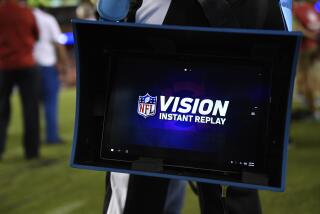NFL follows corporate America’s game plan in referees dispute
The one thing about the National Football League on which almost everyone agrees is that it takes its job of providing first-rate entertainment very seriously.
That could be one explanation for the league’s effort to supplement the pleasure of watching two teams of superbly trained athletes compete by adding the comedy stylings of pick-up referees, capped by the spectacular fiasco of Monday night’s Seattle Seahawks-Green Bay Packers game.
Or the explanation may be simply that a business collecting more than $9 billion in revenue this year sees value in sacrificing one crucial component of its success — credible and firm enforcement of the rules — merely to save about $5 million a year, or five hundredths of a percent.
That’s the difference in retirement contributions between what the league wants to pay its referees and what the referees have said they’d accept. And that’s one of the major sticking points in the high-profile labor dispute between the NFL and its refs that has made a mockery of the league’s supposed commitment to professional on-field standards and player safety.
Most news coverage of this labor dispute focuses on the ineptitude of the fill-in referees; this week there will be a lot of hand-wringing over the flagrantly bad call that turned a Green Bay interception into a game-winning Seattle touchdown, as if by alchemy. Occasionally you’ll read that the disagreement has something to do with retirement pay. But it’s really about much more.
It’s about employers’ assault on the very concept of retirement security. It’s about employers’ willingness to resort to strong-arm tactics with workers, because they believe that in today’s environment unions can be pushed around (they’re not wrong). You ignore this labor dispute at your peril, because the same treatment is waiting for you.
Even before Monday night, discontent with the replacement refs had spread so widely — from fans, to coaches and players, even to broadcasters, who almost never criticize the league — that the NFL could not overlook the damage to its reputation. In the last week, the league and the National Football League Referees Assn. had started talking with each other again. Those talks are likely to pick up urgency now. Whether the NFL’s plutocratic owners will recognize that good officiating costs money — that’s another question.
To recapitulate the dispute, the NFL locked out its referees in June, following the expiration of their last union contract, reached in 2006. That deprived the 121 referees of per-game paychecks averaging about $9,000 each for (thus far) the first three weeks of regular-season play.
If you decide these men don’t deserve your sympathy, it’s not hard to find a reason to scorn them — indeed, NFL executives have been happy to lay some out, sub rosa. They’ve mentioned that the refs are part-timers who are somehow able to pull down an average $150,000 each to work the games. They’ve noted that the league’s generous contract offer would raise that average to more than $200,000 in seven years.
They’ve pointed out that officiating is a second job for almost all the refs — they’re lawyers, investment managers, business executives, coaches and schoolteachers. “We want to treat them fairly,” Greg Aiello, a spokesman for the NFL, told me last week. “They’re well compensated, and we’re offering an increase in total compensation, but their economic demands are unrealistic.”
There’s a “yes, but” clause to the NFL’s position. Although the league offered an overall raise, it has also proposed to add 21 men to the officiating roster, which it says would give it more flexibility to sit refs out of games or sack sub-par officials.
The referees union points out that this could leave each working ref with a smaller share of the pie over the course of a season. That’s because game-day pay comes from a lump sum apportioned partially by seniority; the pool was $18.6 million last year, not counting retirement. But because the league isn’t proposing to increase the pool specifically to cover 21 more refs, it would have to be spread among 142 members instead of 121. You do the math.
What was overlooked, at least until the replacement refs started working their alchemy, is that officiating in the NFL is no picnic. As my colleague Sam Farmer reported in 2007 after getting a rare opportunity to tail a refereeing crew, “the pressure is intense and the scrutiny unbelievable.”
The refs’ work was graded every week by league supervisors as obsessively legalistic as insurance company lawyers looking over your hospital claim. One supervisor told Farmer that you could count the number of crews that had received perfect scores for officiating a game on the fingers of one hand.
“It’s an incredibly difficult job,” agreed Michael McCann, a sports law expert at the Vermont Law School. “You have 22 guys going at full speed and in close contact, and the rulebook is harder than my antitrust law class.”
The league used to boast that its officiating accuracy was close to 97%, which you would think would justify paying the refs top dollar without whining. (What is it so far this year?) But here’s what’s really at stake in the negotiations.
One major issue is the NFL’s insistence on changing the retirement plan for all refs from a traditional defined-benefit plan, based on the employees’ pay and years of service, to a 401(k)-style defined-contribution plan. The defined-benefit plan covering existing refs would be frozen and terminated — they’d get what they’ve earned so far, but no more. The referees union has already agreed to the changeover for all newly hired members but proposes to grandfather the old plan for existing refs, allowing them to continue to accrue benefits.
NFL Commissioner Roger Goodell has argued that defined-benefit plans are a thing of the past — even he doesn’t have one, he told an interviewer recently, as though financially he’s in the same boat as any other league employee.
This is as pure an expression as you’ll find of the race to the bottom in corporate treatment of employees. Industry’s shift from defined-benefit retirement plans to 401(k) plans has helped to destroy retirement security for millions of Americans by shifting pension risk from employer to employee, exposing the latter to financial market meltdowns like those that occurred in 2000 and 2008.
It’s true that employers coast-to-coast have tried to put a bullet in the heart of the defined-benefit plan. The union representing 45,000 Verizon workers gave up on such coverage for new employees to settle a 15-month contract dispute.
But why anyone should sympathize with the desire of the NFL, one of the most successful business enterprises in history, to do so, much less admire its efforts, isn’t so clear. If you have one of these disappearing retirement plans today, don’t be surprised to hear your employer lament, “even the NFL can’t afford them” tomorrow.
Something else to watch is the league’s eagerness to impose a lockout in labor disputes. This is the same tactic the National Hockey League is using against players right now. Lockouts have become more widespread generally: A recent survey by Bloomberg BNA found that as a percentage of U.S. work stoppages, lockouts had increased to 8.07% last year, the highest ratio on record, from less than 3% in 1991. In other words, work stoppages of all kinds have declined by 75% in that period — but more of them are initiated by employers.
The reasons are obvious. “Lockouts put pressure on the employees because nobody can collect a paycheck,” said William B. Gould IV, a former attorney for the National Labor Relations Board and a professor emeritus at Stanford Law School. “In a lot of major disputes, particularly in sports, it’s the weapon du jour.” Think about that the next time someone tells you that unions have too much power.
The NFL’s treatment of its referees reminds us that pro sports has entered a new phase. In 1984, Major League Baseball umpires went on strike in the middle of the playoffs. The new baseball commissioner, Peter Ueberroth, immediately reached a deal to get them back on the field and to act as arbitrator; eventually he ruled in the umpires’ favor. Is the NFL so blinded by its determination to nickel-and-dime its field officials out of their retirement package that it won’t notice that its game has been turned into a shambles?
The NFL talks incessantly about regard for players’ health and fans’ enjoyment, and has undermined both by allowing refs from high school circuits and the Lingerie Football League (no lie) to officiate its games. In the referee dispute, the league is acting true to form: Its words have the aroma of high principles and its actions the stench of short-term greed. It’s been said that football simply replicates the rough and tumble of the real world, and in this case, sadly, the observation is too true.
Michael Hiltzik’s column appears Sundays and Wednesdays. Reach him at mhiltzik@latimes.com, read past columns at latimes.com/hiltzik, check out facebook.com/hiltzik and follow @latimeshiltzik on Twitter.







